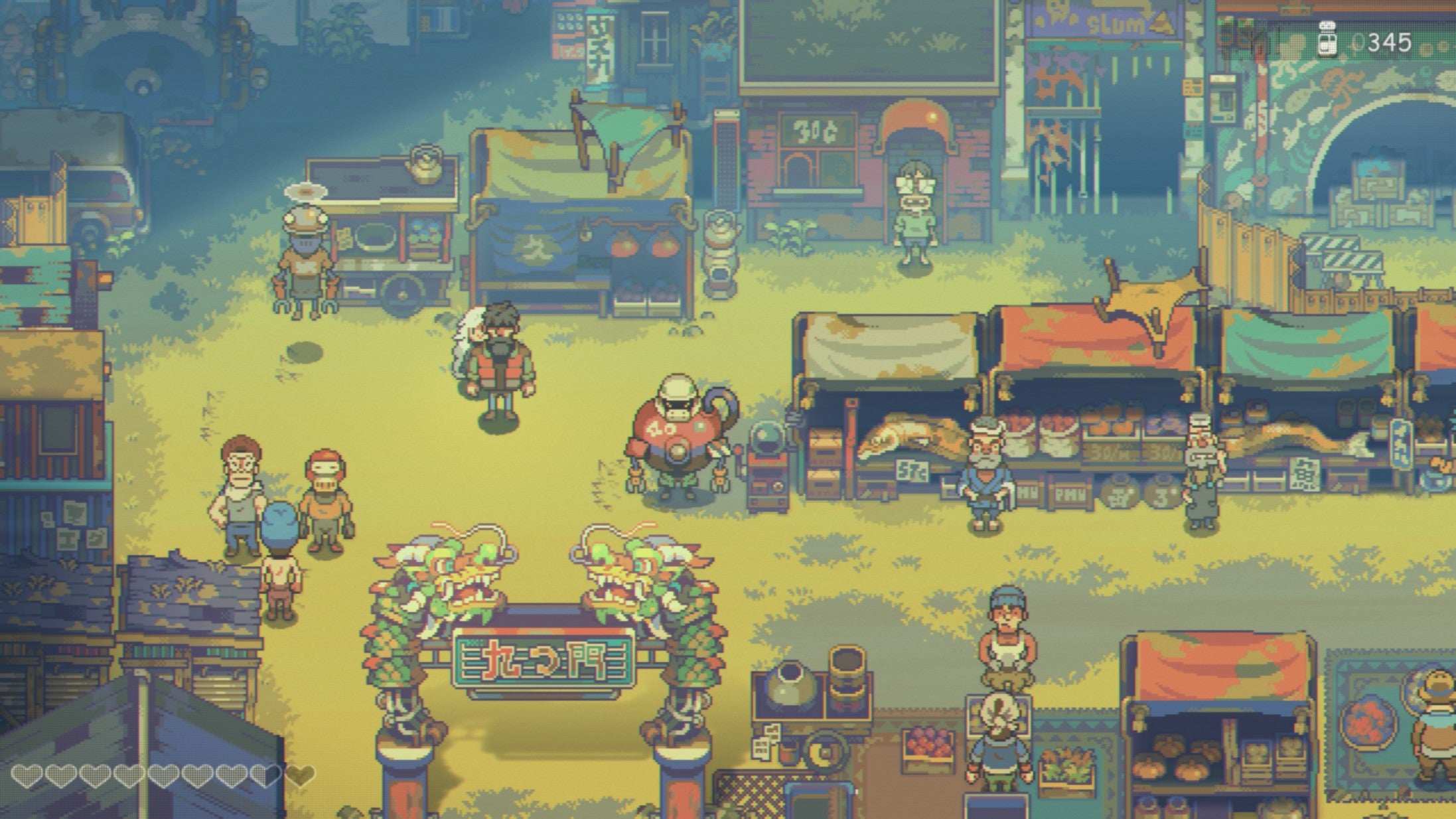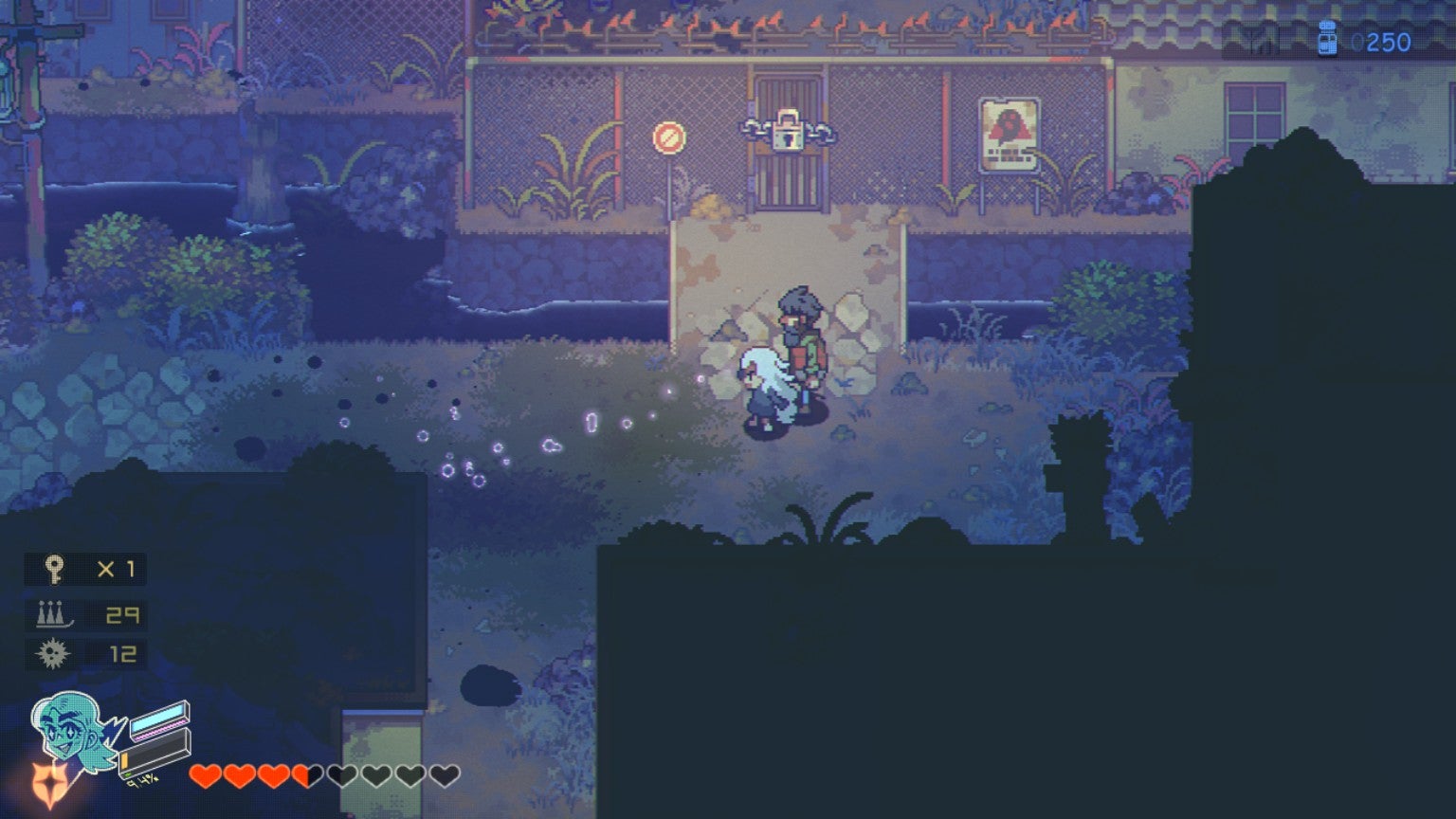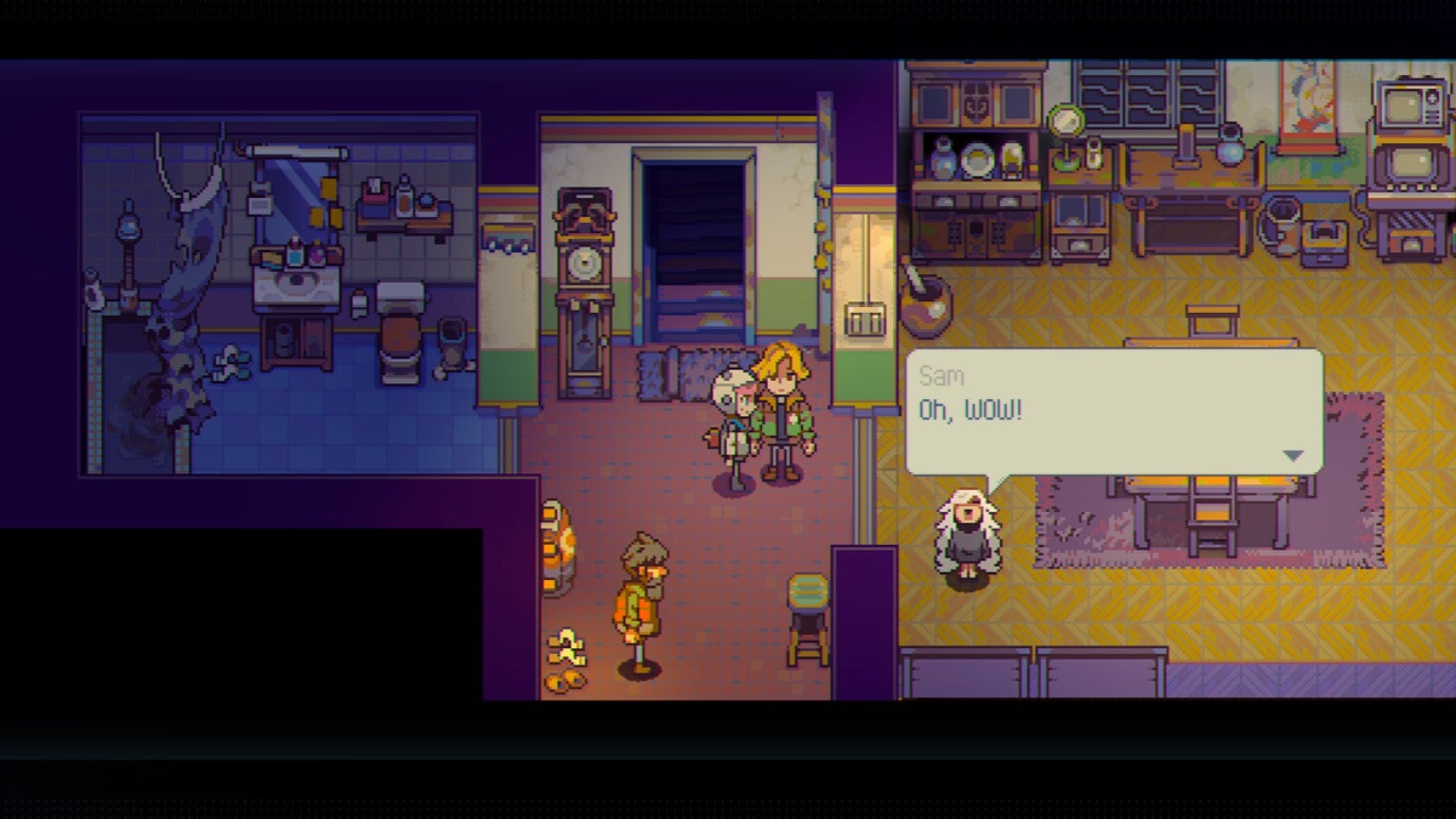In this impressive debut from Shanghai developers Pixpil, these humdrum slices of life are placed front and centre, forming much of the narrative backbone that drives the game forward. This is still a game that’s ultimately about saving the world from a mysterious and all-consuming miasma, but it’s also one that makes damn sure you know what you’re doing it all for - and that’s its striking cast of NPCs. As you busy yourself with the minutiae of their everyday lives, Eastward makes every person (and robot) count in this deadly post-apocalypse, and the result is an affecting, detail-rich tale that owes as much to the action of top-down Zelda games as it does to the role-playing intimacy of Earthbound.
You play as Sam and John, an unlikely duo who begin their journey in an underground mining community who have been taught to fear the outside world. Sam’s boundless energy provides a welcome contrast to John’s gruff, silent schtick, but thanks to Pixpil’s detailed and expressive animations you really get the sense this tough old digger cares deeply about his spirited and curious ward. And it’s just as well, because Sam’s desire to know about this fabled place with a real blue sky and proper green grass ends up getting John into all sorts of trouble during the game’s extensive introduction, causing them to become exiled from their home and thrown out into the world above.
It’s one of the more luxurious openings to a game I’ve seen in a while. Instead of hurrying you along to get to ’the good stuff’, Eastward takes its own sweet time introducing its various systems, giving each element its own dungeon to make sure you absolutely know how it all works. Over the course of three hours, you’ll first learn to swing John’s trusty frying pan, before combining his iron-clad left hooks with some light environmental puzzles - the usual switch flipping, wire connecting, wall bombing and platform altering fare you’ll have seen dozens of times before - then, once you’ve fought off your first boss, you get to play with Sam’s energy beam powers, and then there’s another couple of dungeons teaching you how to use Sam and John’s abilities in tandem, one when they’re together and another when they’re apart on the same map.
While some will no doubt appreciate its gentle, methodical pacing, I suspect others may find it too much of a slow burner to carry on - and indeed, there were frequent moments where I felt like giving the story a good whack with John’s trusty frying pan to get it moving. But it’s worth persevering with Eastward. It takes a while to get going, sure, but only because it does such a good job of placing you right at the heart of Sam and John’s community, its story and NPCs getting as much air time as John’s kitchen equipment. And honestly, hats off to Pixpil’s stunning animation team. Everyone is so well-observed in this game, both in terms of their frequently funny dialogue and the way they move and express themselves. Even the smallest character gets their own bespoke animations in Eastward, and it makes you want to talk to everyone you meet just to see what happens.
You feel invested in this perilous world, and your resolve to protect this daft and endearing mix of humans and robots only grows stronger in the face of outside hostility. This isn’t a game that pulls its punches when it comes to venturing out alone, and the creatures and monsters of Eastward are all vicious heart munchers, taking down less careful players with surprising ease. Eastward’s action isn’t quite as nuanced as Zelda’s - tiny, pixel-high bugs and big, poison-spewing boars will take one whole heart apiece if either Sam or John crash into them, with no high-pitched warning sting to tell you when to be extra wary - but the broad strokes of its real-time combat will feel instantly familiar.
As well as doling out hearty metallic slaps with your pan, John can charge up his swings for meatier takedowns and deflect incoming projectiles by batting them away. Later on he’ll acquire other weapons including a gun, flamethrower and all manner of different bomb types (which you can also wallop pleasingly across the map), although limited ammo supplies means you’ll probably only whip these out when absolutely necessary. You can call on a small robot pal to come and replenish some of your stocks if you need them for a critical puzzle, thankfully, but its lengthy cooldown period means you can’t spam it for lots of free refills.
Sam’s strengths, meanwhile, are more strategic. Her energy beams allow her to stun and suspend enemies in the air (either so she can dodge them and move on or allow John to give them a face full of lead), destroy certain types of plant blockades and dispel clumps of miasma. Ultimately, though, she lacks a killer attack of her own, and the combination of her shared health bar with John and the sheer number of aggressive enemies you face means she ends up feeling quite side-lined as a result. It’s often safer and easier to simply fall back on John’s admittedly excellent frying pan rather than attempting anything more sophisticated. Boss fights are the rare exception. These regularly make excellent use of both characters’ strengths, so it’s a shame this doesn’t get passed down to the rank and file.
Eastward is also much less generous about replenishing your health than other genre contemporaries, but luckily this shortfall can be remedied very easily by engaging with Eastward’s delightfully Breath Of The Wild-esque cooking system. Stoves are in plentiful supply here, and they often accompany the game’s strangely existential fridges that double up as save points. All you need is to throw a bunch of ingredients into John’s frying pan and you’re guaranteed some sort of dish at the end of it. The foodstuffs themselves aren’t the wildest or most imaginative culinary feats you’ve ever seen, but they’re essential to survival. Some will replenish standard red hearts, others will bestow extra yellow hearts on you instead, which act as a buffer for your remaining reds. Others will be a combination of both, and adding expensive spices to the mix will add extra stat buffs - all of which can be intensified with the accompanying slot machine minigame.
You will, however, need to keep a watchful eye on John and Sam’s shared health bar, as there’s no high-pitched warning sting when you’re getting a bit low. This is perhaps the only major failing of Eastward’s otherwise stunning soundtrack and overall sound design, and death can come surprisingly quickly if you’re not paying attention. Thankfully, the game’s per-screen autosave (a welcome addition since I last saw it at preview) means defeat isn’t as frustrating as it could be given its retro sensibilities, and you’re back in the action pretty quickly with all your progress intact.
And yes, some of that action will involve fetching rare fish from the belly of an even bigger fish so you can serve up the ultimate dish of forgiveness to a scheming casino lord, and yes, you’ll also be hunting down mischievous creatures in the forest to help out the village ranch. It’s all in a day’s work for this unlikely pair of world-saving do-gooders, but gosh darnit if I didn’t also enjoy every second of it. It may be slow to get going, but once Sam and John find their feet, Eastward roars to life like nothing else. Pixpil have created a world of exquisite detail here, and its winsome cast are easily the best bunch of NPCs you’ll meet this side of Toby Fox’s Undertale. It’s been a long time since I’ve cared this much about the everyday folks in an RPG, but as Eastward handsomely proves, pigs really do fly in this excellent retro adventure.



